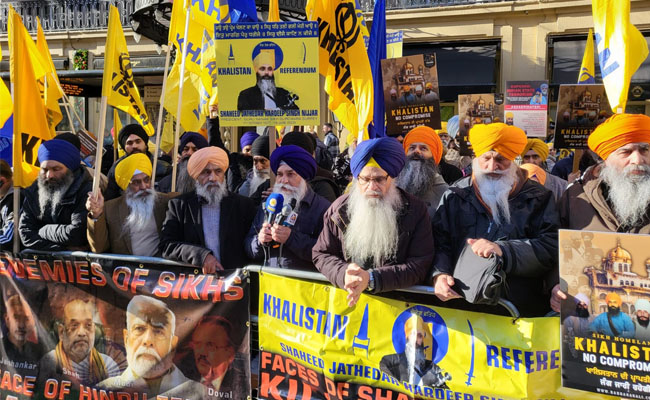London, 26 January 2024. Leading Sikh organisations in the UK again protested outside the Indian High Commission on India’s 26 January Republic Day, in what has become an annual gesture of defiance against the unlawful, genocidal and cowardly suppression of the Sikh freedom struggle in Indian-occupied Punjab. In the backdrop of the recent major international scandal involving Indian agents being caught carrying out targeted killings of Sikh nationalists, exposed by no less than the Five Eyes network of Western intelligence agencies, the vociferous protestors made it clear to the Modi regime that no amount of state terrorism and transnational repression will derail the struggle for Khalistan. India’s foreign policy debacle over the recent targeted killings of Sikhs in Canada, the UK, the US and Pakistan, all of which have received coverage in the international media, has left its agents facing murder charges and extradition to the US, where the FBI seems in no mood to compromise with the brazen criminality of Indian PM Modi’s henchmen.
Speaker after speaker at the London protest reminded the Modi regime that the Sikh nation, over the course of history, has seen off more powerful tyrants than the Hindutva state. Self-determination lies at the heart of both the Sikh theo-political worldview, as well as international law – and it underpins the lawful, just struggle for freedom in Punjab. Referring to the Sarbat Khalsa (national gathering) decision in 1986 to respond to India’s genocidal onslaught in 1984, by establishing a sovereign independent state of Khalistan in the Sikh homeland, they warned the Indian establishment that its continued aggression against the Sikhs will simply hasten the disintegration of a colonial state that has already become a pariah amongst the civilised global community.
US President Biden’s refusal to attend the showpiece Republic Day parade in Delhi this week was a clear message to Modi that, whilst a rogue state may be useful on occasion, carrying out assassinations on US soil was way beyond the red line. Sikhs in the US also protested yesterday, calling for the Sikh right of self-determination to be implemented without delay, especially as the world’s policy and decision makers had seen such tangible evidence of the evil still being perpetrated against Sikhs. In Punjab too, Sikh organisations robustly demanded freedom and called for international intervention to peaceably restore the independence of Punjab and to secure the release of Sikh political prisoners.
At the London protest, India’s watching ‘diplomats’, whose ranks have been humiliatingly depleted since their intelligence officers were recently shown the door for their part in the assassination programme, were also warned that genocide perpetrators and those directing the hit squads will be held to account. The example of the case brought by South Africa in the International Court of Justice in respect of the horrific killings of civilians in Gaza makes it obvious, the protestors said, that there will be no place to hide for those in power that defy the most basic demands of humanitarian law.
The ongoing Punjab independence referendum being conducted within the vibrant Sikh diaspora has been criminalised in India, despite being an exclusively peaceful and democratic exercise; it has shown massive support in favour of freedom in Punjab. New Delhi has once again panicked and Hindutva’s murderous criminals have been caught red handed targeting Khalistanis, in Punjab and abroad. Yet this is a foolish, futile policy that has only redoubled the resolve of the Sikhs and brought international opprobrium to the likes of Modi, Jaishankar, Doval and Shah.
The Hindutva regime in New Delhi, unlikely though that may be, should realise that it is time to acknowledge the Sikh nation’s right to self-determination and move towards peaceable conflict resolution. The Sikhs are in no doubt that Khalistan will be liberated, but the sooner that happens the better – for all concerned. The peace dividend in Punjab will bring dignity, security and prosperity to its people, as well as wider regional stability – Khalistan will be a buffer state lying between three nuclear-armed rivals who are otherwise potentially destined for catastrophic conflict. It is time world powers facilitated a just and durable outcome, defined by international law and human rights, as much as by pragmatism.
Ranjit Singh Srai, Coordinator, Self-Determination Council, The World Sikh Parliament
